Part 5. Read Previous Part Here
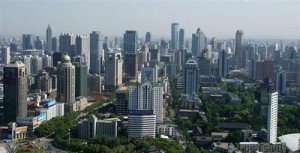
Girl Guide:
We were flying towards Nanjing on a fully crowded intercity train. Crowds were mainly workers and students going back home for the weekend from Shanghai. Young Chinese have a craze for English language and foreigners. Since we were talking in English, a girl joined the conversation. She was a student in a college. Our manager seized the opportunity and introduced us to her, and requested if she could be our guide to Nanjing the next day. She agreed and so we got a local girl guide for our tour!
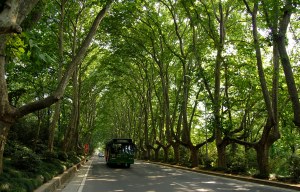
Chinese Youth Loves Foreign Culture:
Chinese youth adore foreigners, especially English speaking, and foreign culture such as dress, pop music and fast food. This is a cultural win of West over China. If you want to subdue a nation, make it look down upon its own culture. West has succeeded in it. Look at us Muslims especially Pakistanis youth, we dislike our language, dislike our food, and dislike our dress. Am I wrong?
Love-Hate with South Koreans:
For fashion trends Chinese look up to South Koreans. In fact Chinese have a love-hate relation with them. South Koreans look down upon Chinese as their poor uncivilised cousins. In return Chinese consider South Koreans the arrogant yet stylish. This is probably true for India-Pakistan also, and you know who is the poor cousin here!
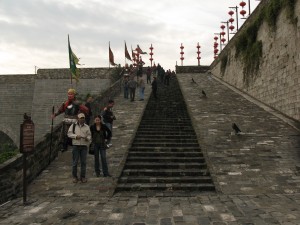
My First Chinese Home:
It was almost midnight by the time we reached our manager’s home. It was an apartment in a high rise building. I was excited to be in a Chinese home though tired, hungry and exhausted. We removed our shoes as we entered; it is customary to remove outdoor shoes at the door and walk bare footed or use soft slippers inside the house. Soon after our arrival the host insisted that we must take shower. But Romeo & I declined, saying we are tired and we promise to do so next morning. But more we were declining more he was insisting. Eventually we mutually agreed to wash our faces & feet. I then realised that it is also customary to wash oneself when one reaches home! After this ritual, we had our dinner and headed to beds. After a nice Chinese breakfast next morning, I & Romeo left to meet our Chinese guide who had promised to show us the interesting parts of Nanjing.
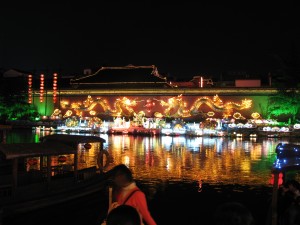
Dynasties of China:
China had many Dynasties; a Dynasty is an era of a family’s kingdom-ship (as we had a period of Abbassi Khilafat or Mughal rule for example). First recorded dynasty Xia (Zia) came about 2100 BC (yes before Christ i.e. about 4000 years from now). Ming Dynasty, the 2nd last before China becoming Republic, ruled from 1368 to 1644 established its capital in Nanjing. Ming’s founder father Zhu ordered the construction of a City wall all around Nanjing. Building City Walls was a common defense mechanism deployed in China. Nanjing’s one was the largest ever city walls built in China. Nanjing City Nanjing is the old capital of China. It lies in south of China on the banks of River Yangtze (the most famous & 3rd largest river in the world). Nanjing the capital of Jiangsu Province is one of the most delightful destinations in China. Known as the capital city of six (or ten) dynasties, it is full of cultural heritage. Present Nanjing is a modern, prosperous and one of the rich cities in China.
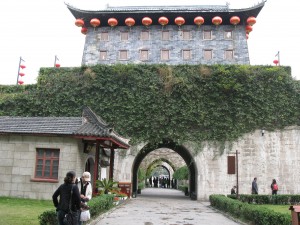
Nanjing City Wall:
We started our tour from the City Wall. It is in great shape even though it is 450 years old. The wall is layered in architecture to resist invaders at multiple points. There is a museum inside the wall building. It was dominated by the objects & photos from Ming era.
Dr. Sun Yat-sen Mausoleum: Dr. Sun Yat-sen’s Mausoleum is situated at the foot of the second peak of Mount Zijin (Purple Mountain) in Nanjing. Bus dropped us at the bottom of the hill. There are nice parks and shops here. After buying tickets, we climbed the long stairs. View at the top was breath taking.
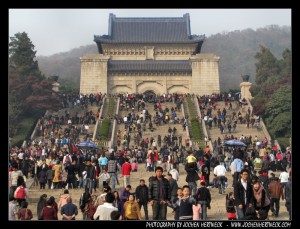
Linggu Temple / Pagoda: This Buddhist temple is situated in a scenic spot. There were many monks here, reciting their scriptures. People were burning candles in the yard and hanging written slips on tress; probably a Buddhist ritual. Shensong House, the famous vegetarian restaurant in the temple, lies next to the main building. The vegetarian diet in the temple is renowned for over 600 years. I wished to dine here but it was closed unfortunately. Surrounded Shensong House, is a thick forest and blooming flowers. There is Linggu pagoda in the middle of jungle. It was indeed very scenic spot.
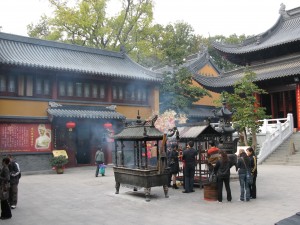
Modern City: We were tired by now; it was decided to head to the modern part of the Nanjing. This part was filled with shopping halls, high-rise buildings, traffic and young crowd. We walked around the River Quinhuai. The Confucius tomb is also situated on its banks. The view with colourful lighting was stunning. There are very old and famous restaurants here. We chose McDonalds; don’t remember why but wasn’t a good choice, or was it?
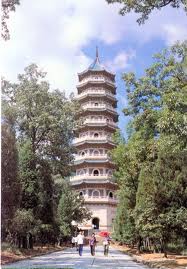
Sad Memories of Nanjing’s History:
Apart from its Glorious past, Nanjing has seen real dark days in Chinese history. On a battleship in Nanjing, a corrupt Qing dynasty government, under threat by Britain troops, signed the notorious ‘Nanjing Treaty’, the first of the ‘Unequal Treaties’ which gave away Hong Kong to Britain for more than hundred years.
Nanjing Massacre:
In 1937, the notorious Nanjing Massacre took place in the hands of Japanese army after they conquered the city. Within six weeks of entering Nanjing, they killed 300,000 Chinese people including women and children. There is an exhibition of the massacre photos taken by Japanese photographers. You won’t be able to sleep for days if you see these photos. Allah takes care of the oppressors; it was only few years that USA, another oppressor, dropped two Atom Bombs on Japan, strangely killing similar number of people as in Nanjing. Bomb in Hiroshima burnt around 80,000 people instantly, this is the biggest ever killing of humans by humans in one split second. Japan changed its aggressive war policies after that and completely abolished its army. I wish USA does the same, soon.
We headed back to Shanghai after dinner.
Read Next Part Later..